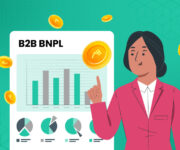The Micro, Small, and Medium Enterprises (MSME) sector requires small- to medium-scale credit with quick approval times and reasonable interest rates. It is generally difficult for these companies to provide collateral to procure loans.
No wonder the business-to-business (B2B) buy now, pay later (BNPL) scheme has become a major boon for these companies. This scheme gives MSMEs access to quick and easy loans without collateral, enabling them to maintain cash flow and stay afloat during trying times.
The B2B BNPL space has been controlled almost exclusively by fintech. But banks are also trying to gain a foothold in this market.
A Brief Explanation of The B2B BNPL Scheme
The B2B BNPL scheme is digitally processed. An MSME firm can apply for a loan and get it approved digitally without visiting any office. They only have to upload their KYC documents, the loan amount, and other necessary proofs and begin their loan processing. The BNPL application automatically calculates each company’s maximum credit limit. The application generally approves loans within a few hours or days, depending on the loan amount.
The repayment schedule varies across different BNPL schemes. Some providers give customers a few months to repay, while others allow them a few years. There are systems where customers can pay off their loans at once or in a few large chunks to reduce their interest payments.
When an MSME needs a quick loan, BNPL schemes become convenient and provide hassle-free, transparent credit access. The MSMEs can use their BNPL loans for their audits and tax calculations.
Why are Banks Interested in the B2B BNPL Market?
One primary reason why banks are interested in the B2B buy now, pay later market is because they have realised the massive growth potential of this sector. There is a global credit crunch, and the MSMEs bear the brunt of it. Most MSMEs do not have access to credit that will help them handle even minor payment delays from their clients.
MSMEs have very limited cash flow and rely heavily on their client invoices clearing in time to keep their operations running. But these invoices are often not approved or cleared on time for various reasons (operational or international banking problems, etc.). The business faces a severe cash crunch where it cannot afford to keep its lights on. In such situations, if they had access to some easy credit, their operations could go on uninterrupted.
All over the world, MSMEs play a major role in global supply chains by acting as suppliers and vendors. Production operations go haywire in even the biggest international firms if MSME productions are disrupted for any reason.
This massive importance of easy credit for MSMEs and the scale of this credit requirement is very lucrative for banks, bringing them to B2B BNPL.
How Can Banks Enter the B2B BNPL Market?
Banks have access to a massive amount of capital– much more than a fintech– so they are already at an advantage when entering any credit market. But banks lack the technical know-how and experience in BNPL schemes. Some banks are tackling this problem by pairing with fintech companies. However, this system has problems because the bank will have to maintain very strict tabs on the legal conformity of their fintech partners.
On the other hand, some banks are taking a risk and developing their own B2B BNPL schemes without any fintech partners. They are solving the problem of their lack of technical expertise and experience in the BNPL sector by using software solutions and products from third-party providers. These products/services make it easier for banks to process BNPL applications. Banks can use their newly purchased automation systems to enter a new market safely without overextending their workforce.[1]
One product that can help a bank set up its BNPL credit scheme is Finezza. Finezza has a complete suite of products targeted toward banks and lending companies. These products are supposed to make it easier for lenders to process and analyse loan applications and give out loans.
Finezza’s system helps banks weed out false applications and determine a good credit limit for different applicants. It also helps banks verify all applicant documents and process credit approval.
Finezza products for credit approval systems include:
- An application status tracking product that helps to manage loan applications from different customers and keep them organized for future assessment and approval.
- A document verification system helps track whether a customer has submitted all their KYC details and then verifies and cross-checks these details with the documents the customer has uploaded.
- A loan approval and risk assessment software assess each customer’s ability to repay their loan using different parameters from their application and KYC details. Banks use the results of this assessment to weed out high-risk applicants and determine the maximum loan amount for each client.
- A loan disbursement software tracks when and how much of the loan amount is withdrawn by each client. This record is very important to calculate repayment amounts and gives banks an idea of how much total credit it has disbursed across the BNPL scheme.
In the coming years, the BNPL market will only grow more. B2C BNPL and B2B BNPL will grow aggressively under the leadership of major fintech. But banks cannot stay aloof from the process any longer. While it may take a little longer for banks to enter the B2C BNPL market, the B2B BNPL market is already seeing the entry of major banking players.
Banks are also betting on easy credit schemes, and BNPL seems to be the game-changer the finance market was waiting for. But banks cannot expand into BNPL without any help. Companies like Finezza are paving the way to creating products that integrate with a bank’s operating system to expand into the BNPL space effectively. Reach out to us today to learn more about the services and tools we have to offer!




Leave a Reply